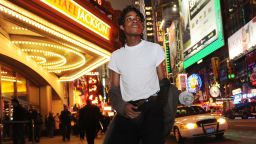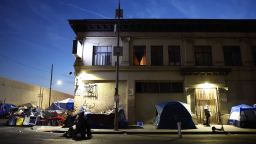The Marine veteran who held an unhoused Black man in a deadly chokehold aboard a New York City subway train earlier this month defended his actions and said in an interview with the New York Post the killing “had nothing to do with race.”
Daniel Penny, 24, told the newspaper he’s “deeply saddened by the loss of life,” amid what has become a contentious homicide case that has highlighted New York’s handling of homelessness.
“This had nothing to do with race,” he told the Post. “I’m not a white supremacist. … I’m a normal guy.”
The interview is the first time Penny has spoken publicly since being charged with second-degree manslaughter in the killing of Jordan Neely, a New York City street artist known for his Michael Jackson impersonations. Penny’s comments also come a day after Neely’s funeral was held in Harlem.
Penny has been out of jail on $100,000 bond. He has not been indicted and has not yet been required to enter a plea.
He held down Neely in a fatal chokehold on the subway train May 1 after Neely began shouting at passengers that he was hungry, thirsty, had little to live for and didn’t care if he died. Penny forced 30-year-old Neely to the train floor and restrained him in a chokehold until he stopped breathing. A medical examiner ruled Neely’s death a homicide.
Penny would take action in a similar situation again, “if there was a threat and danger in the present,” he told the Post.
While he said could not go into detail about how the confrontation unfolded because of his pending case, he described the incident as unlike “anything I’d experienced before.”
“It’s tragic what happened to him,” Penny told the Post. “Hopefully, we can change the system that’s so desperately failed us.”
Neely’s killing unfolded as the nation’s most populous city continues to grapple with the fundamental issues of a growing population of people experiencing homelessness and a mental health crisis – despite government efforts to alleviate the challenges.
In response to the interview, Neely family attorneys called Penny a “killer.”
“This is an advertisement to soften the public’s view of Daniel Penny who choked Jordan Neely to death. We never called him a white supremacist, we called him a killer,” said a joint statement from attorneys Donte Mills and Lennon Edwards. “We want to know why he didn’t let go of that chokehold until Jordan was dead.”
Meanwhile, Penny’s attorney reiterated after the interview that his client “was protecting himself and everyone on that train.”
“But what gets lost is that, at the time he acted to defend those people, he put his own life and well-being on the line,” Steven Raiser wrote in a statement to CNN. “He had no way of knowing if he would be hurt or killed. He acted anyway by putting the well-being of everyone on that train above his own. It didn’t matter what race or religion, he acted to protect them all.”
After he was charged, Penny was required to surrender his passport and has been barred from leaving New York state without judicial approval.
Governor reacts to video
Neely’s killing, part of which was captured on video and posted online, sparked demonstrations calling for justice in his case as Manhattan prosecutors spent days deliberating how to proceed before apprehending and charging Penny.
The case also garnered reactions from top officials including New York Gov. Kathy Hochul, who described the video of the killing as “horrific.”
At Neely’s funeral Friday, the Rev. Al Sharpton delivered the eulogy, saying Neely “wasn’t trying to be something negative,” but wanted to “be like Michael” and “made the world smile and get on one beat.”
“We can’t live in a city where you can choke me to death with no provocation, no weapon, no threat, and you go home and sleep in your bed while my family got to put me in a cemetery. It must be equal justice under the law,” Sharpton said.
Neely was on a New York City Department of Homeless Services list of the city’s homeless with acute needs – sometimes referred to internally as the “Top 50” list – because people on the list tend to disappear, a source told CNN.
CNN’s Samantha Beech contributed to this report.








